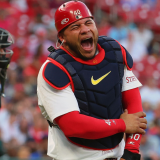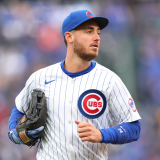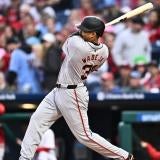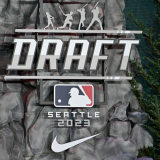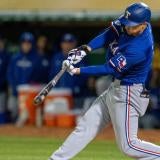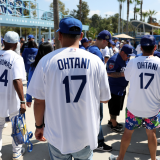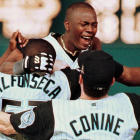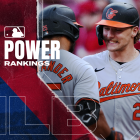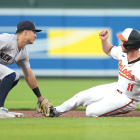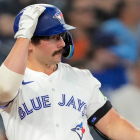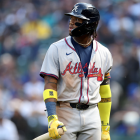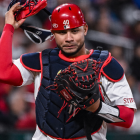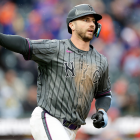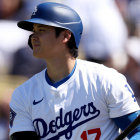Come January 18, the 2017 Hall of Fame class will be revealed. In the time leading up to that announcement, we'll be profiling a Hall of Fame candidate per day -- provided, that is, the candidate received votes on at least five percent of the ballots.
However we're going to begin the process by looking at the one-and-done candidates -- those who, in their first year of eligibility, are expected to fall short of the five-percent minimum required for inclusion on future ballots.
This year's ballot includes 19 first-time players. Three of those (Ivan Rodriguez, Vladimir Guerrero, Manny Ramirez) are safe, based on public ballots; another (Jorge Posada) is on the fence. There's nothing unclear about the fate of the other 15 -- to date, they've combined to receive two votes.
The players are presented in alphabetical order ...
Casey Blake
While Blake is perhaps best known for being the player the Cleveland Indians traded to acquire Carlos Santana, he authored a respectable 13-year career as a third baseman-slash-four corners utility option. He never made an All-Star Game or received award consideration -- and he didn't break into the majors as a regular until he was 29 years old -- but he did hit .264/.336/.442 (a 107 OPS+) with 167 home runs. Solid role player player, albeit far from Cooperstown worthy.
Pat Burrell
Burrell was selected No. 1 overall in the 1998 draft, yet was arguably the third-most productive player taken in the top five that summer (behind J.D. Drew and Mark Mulder). All the same, Burrell hit .253/.361/.472 (116 OPS+) with 292 home runs over a 12-year career. He received MVP consideration in two seasons, but was unable to capture an All-Star Game appearance. Burrell won a pair of World Series -- first with the Philadelphia Phillies in 2008, then with the San Francisco Giants in 2010.
Orlando Cabrera
Cabrera will forever be remembered by virtue of 1. his involvement in the Nomar Garciaparra trade and, as a result, 2. his inclusion on the curse-breaking, title-winning 2004 Boston Red Sox. A two-time Gold Glove Award winner and reputedly a slick fielder, Cabrera's defensive ability looks less impressive when viewed through the lens of advanced metrics. Regardless of how you judge his fielding, his offensive exploits over 15 seasons -- a .272/.317/.390 slash line, or an 84 OPS+ -- cause him to fall short of meriting enshrinement.
Mike Cameron
One of the best defensive outfielders (and most underrated players) of his era, Cameron brought home three Gold Glove Awards during the course of his 17-year career. He did so while recording a 106 OPS+ and smacking 278 home runs. Cameron falls short of Hall of Fame standards, yet he was a high-grade player who deserved more than a single All-Star Game appearance.
J.D. Drew
Speaking of underrated talents, Drew somehow made just one All-Star Game during his 14 seasons in the majors -- that despite hitting .278/.384/.489 (125 OPS+) with 242 home runs. Drew was often criticized for not being an "RBI guy" or for not showing enough emotion. But those brickbats seem trivial given he posted an on-base percentage north of .370 in nine of his 13 full seasons. He's unworthy of enshrinement in Cooperstown, yet he deserved better treatment than what he received.
Carlos Guillen
Guillen was an unremarkable hitter during his first few seasons in the majors. But beginning with his age-27 season, he went on a six-year run in which he batted .304/.374/.480 and made three All-Star Game appearances. Those marks are better than his career totals (.285/.355/.443), however, it was a considerable prime for a player who many forget was part of trade that sent Randy Johnson to the Houston Astros.
Derrek Lee
Everyone remembers Lee's one huge year -- 2005, when he competed for the triple crown while batting .335/.418/.662 with 46 home runs. Outside of that season, however, he was still a highly productive player. He finished having appeared in parts of 15 seasons, hitting .281/.365/.495 (122 OPS+) with 331 home runs. Add in three Gold Glove Awards and two All-Star Game appearances (as well as a third- and ninth-place MVP finish) and you have a quality career.
Melvin Mora
A versatile utilityman early in his career, Mora became an everyday third baseman thanks to posting three consecutive above-average offensive seasons from 2003-2005. It was during those years that he made both his All-Star teams. He also won a Silver Slugger Award in 2004. Overall, Mora finished his 13 seasons having batted .277/.350/.431 (105 OPS+). The fun fact everyone knows about Mora (or, to be more precise, his family): his wife gave birth to quintuplets in 2001.
Magglio Ordonez
Ordonez made six All-Star teams throughout his career, and finished second in voting for the 2007 American League Most Valuable Player Award. A well-rounded hitter, he batted .309/.369/.502 while offering 294 home runs over parts of 15 seasons. Ordonez dealt with some durability woes that robbed his counting stats of some additional flourish, but he was a highly skilled batter who finished with two below-average seasons at the dish: fittingly, his first and last.
Edgar Renteria

Renteria's career seemed honeycombed with potential when he broke into the majors as a 19-year-old, then later that season delivered the World Series-winning hit for the then-Florida Marlins. Yet Renteria became more of a solid player than a superstar -- though he did make five All-Star teams, and won a pair of Gold Glove awards. In 16 seasons, he hit .286/.343/.398 (a 94 OPS+) and finished with 140 home runs and 294 stolen bases. Renteria was also the MVP of the 2010 World Series.
Arthur Rhodes
Rhodes pitched in part of 20 big-league seasons, and was used exclusively as a reliever over the final 14. He retired having thrown 1,187 career innings and saved 33 games, all the while compiling a 4.08 ERA (109 ERA+) and a 2.23 strikeout-to-walk ratio. Though Rhodes spent parts of nine seasons in Baltimore, he finished his career having pitched for nine teams. He appeared in one All-Star Game -- in 2010, as a 40-year-old -- and received a MVP vote in 1997 -- a year in which he threw 95 innings across 53 appearances.
Freddy Sanchez
A preternaturally skilled contact hitter, Sanchez finished his 10-year career with a .297 batting average and three All-Star Game appearances. Unfortunately, his body let him down time and again, and he tallied just three seasons in which he made more than 500 trips to the plate. Sanchez's most noteworthy season came in 2006, when he led the National League in batting average while also tying for the majors lead in doubles. A good what-if candidate.
Matt Stairs
Stairs became a cult favorite due to his resemblance to a jolly plumber. Still, dude could hit. He batted .262/.356/.477 (117 OPS+) with 265 home runs over part of 19 seasons. A less generous description of Stairs would be "a platoon player who offered negative defensive value." No one is arguing he's a Hall of Famer, however. Just that he was fun and good at one thing.
Jason Varitek
A three-time All-Star, Varitek is either over- or underrated, depending on the perspective. There's no debating his offensive output -- he hit .256/.341/.435 (99 OPS+) with 193 home runs over 15 seasons -- but there is cause for disagreement with his defensive value. Varitek finished his career having nabbed less than a quarter of attempted basestealers -- a clip well below the league-average mark. At the same time, Varitek was well-regarded as a staff handler, and new-school catching metrics suggest he was an elite pitch framer. That's not enough to make him a Hall of Famer, yet it does make his defense appear more deserving of praise than scorn.
Tim Wakefield
Wakefield owes much of his 19-year career to his reinvention as a knuckleballer following his release from the Pittsburgh Pirates. He'd go on to sign with the Boston Red Sox, with whom he'd win 186 of his 200 career games. He hung around for two seasons of well-below-average pitching to chase that mark, but he still finished with a 4.41 ERA (105 ERA+). Additionally, Wakefield finished third in 1995 Cy Young Award voting, and made his only All-Star Game as a 42-year-old.







